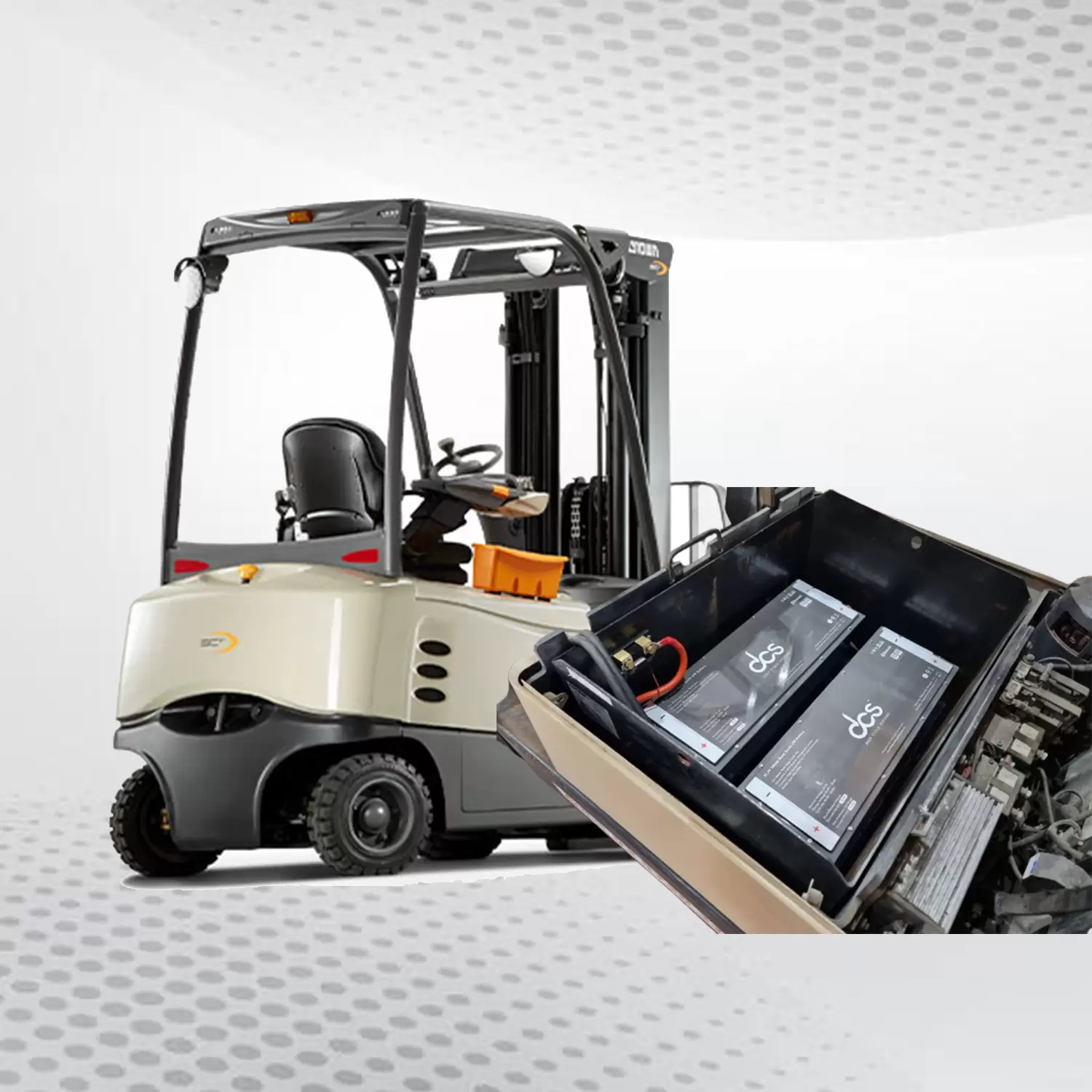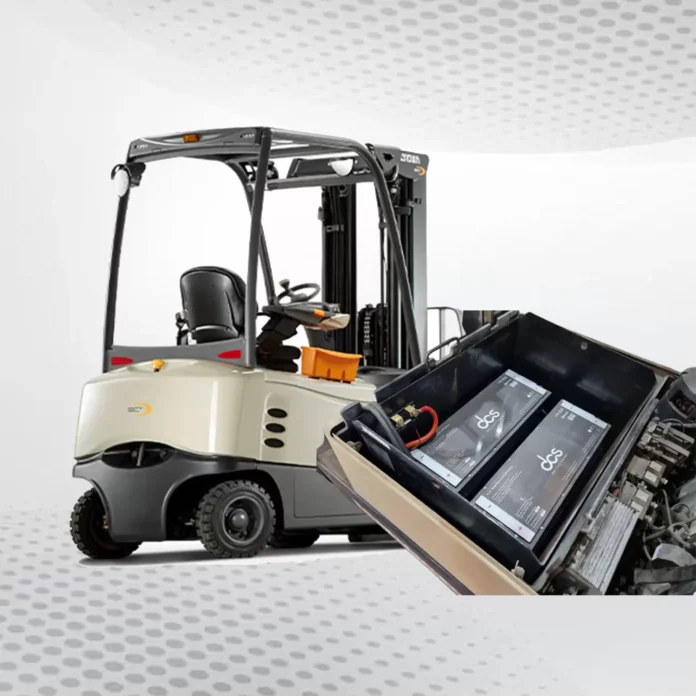Lithium-ion battery technology has revolutionized how we power our devices, from smartphones to electric vehicles. This cutting-edge technology is making its mark in the material handling industry with the introduction of lithium ion battery forklift trucks. These forklifts are changing the game regarding efficiency, performance, and sustainability in warehouse operations.
Unveiling the Power of Lithium-Ion Batteries
Lithium-ion batteries stand out for their exceptional energy density, a feature central to their growing popularity in various industries, including material handling. This remarkable energy density means that these batteries can store considerable energy in a relatively small and lightweight form factor. As a result, forklift trucks powered by lithium-ion batteries benefit from running for extended periods on a single charge. This capability significantly boosts operational efficiency by reducing the frequency of charging breaks, thus keeping productivity levels high.
Moreover, lithium-ion technology exhibits a lower self-discharge rate compared to other battery types, such as lead-acid batteries. This characteristic ensures that lithium-ion batteries retain their charge for longer durations, even when not in use, making them ready for action whenever needed. A lower self-discharge rate is particularly beneficial in demanding warehouse and logistics environments where downtime can have critical impacts on operations.
Additionally, the rapid charging capability of lithium-ion batteries further sets them apart. Forklift trucks equipped with these batteries can be quickly recharged during short breaks or downtime, minimizing operational disruptions and facilitating a smoother, more continuous workflow. This feature is pivotal for businesses aiming to maintain high levels of efficiency and productivity in their operations.
Enhancing Operational Efficiency of Forklift Lithium Battery Manufacturers
The efficiency gains provided by forklift lithium battery Manufacturers are notable, especially in how they reshape operational productivity for manufacturers. These innovative forklifts boast superior acceleration and higher speed capabilities, allowing for swift movement of materials across facilities. This improvement is not just a boost to speed but also to the overall flow of operations, enabling tasks to be completed more swiftly and effectively.
Crucially, the consistent power output of lithium-ion batteries ensures that these forklifts maintain their performance levels throughout the battery’s discharge cycle. This consistency is key in warehouse and manufacturing settings where conventional batteries’ power dips can slow operations. Power reliability means that forklifts can operate at their peak for longer periods, reducing the time and resources spent on recharging or swapping batteries.
Furthermore, introducing lithium-ion battery technology into forklifts directly impacts the operational efficiency of the manufacturers of these batteries. It propels the need for innovation and quality in production, fostering an environment of continuous improvement. This advancement cycle ensures that the forklifts not only meet the current demands of material handling but are also poised to adapt to future challenges, driving efficiency in manufacturing processes and the wider supply chain.
Reducing Total Cost of Ownership
Lower Energy Consumption
Lithium-ion batteries are more energy-efficient than traditional lead-acid batteries, requiring less power to charge and operate. This efficiency translates into lower electricity costs over the forklift’s lifetime, significantly reducing the total cost of ownership.
Minimized Maintenance Needs
Unlike lead-acid batteries, lithium-ion batteries require no water topping, reducing maintenance labour and costs associated with handling and storage. Their solid-state construction also means fewer parts are susceptible to wear and tear, decreasing maintenance expenses.
Extended Battery Life
The longevity of lithium-ion batteries surpasses that of their lead-acid counterparts. With the ability to endure more charge cycles, lithium-ion batteries don’t need to be replaced as frequently, leading to substantial savings in battery replacement costs over time.
Enhanced Operational Efficiency
Lithium-ion batteries’ rapid charging capability and sustained power output allow forklifts to spend more time in operation and less time charging. This efficiency minimizes downtime and can reduce the number of forklifts needed to perform the same work, optimizing asset utilization.
Environmental Compliance Savings
With a growing emphasis on sustainability and environmental regulations, lithium-ion battery forklifts offer a cleaner alternative to traditional forklifts. By reducing emissions and waste, companies can avoid potential environmental compliance costs and may qualify for green incentives or tax benefits.
Improving Workplace Safety and Comfort with Lithium Forklift Battery Companies
The shift toward trucks heralds a significant enhancement in workplace safety and comfort, attributes directly linked to the technological advancements of lithium forklift battery companies. The lithium forklift battery companies have engineered solutions that not only meet the power demands of modern warehouses but do so in a way that prioritizes the well-being of operators and employees. One of the standout safety features of these forklifts is their zero-emission operation. Unlike their internal combustion counterparts, lithium-ion battery-powered forklifts do not release harmful gases, ensuring healthier air quality for workers in enclosed or poorly ventilated spaces.
The benefits extend to auditory health as well. Lithium-ion forklifts’ operation is noticeably quieter than traditional forklifts, significantly reducing noise pollution within the workplace. This quieter operation contributes to a less stressful and more focused working environment, where communication among team members is easier and more effective.
In addition, the enhanced stability and responsive control systems designed by lithium forklift battery companies improve safety on the move. Operators can navigate tight spaces and crowded warehouse aisles with greater confidence and precision, reducing the risk of accidents and enhancing overall workplace safety.
These advancements reflect the commitment of lithium forklift battery companies to not only elevate operational performance but also to ensure the safety and comfort of the individuals who are integral to daily operations.
Lithium ion Forklift Battery Manufacturer Provides Sustainable Operations
The move toward lithium-ion battery forklift trucks represents a significant stride in achieving more sustainable business practices within the material handling industry. Lithium ion Forklift Battery Manufacturer is at the helm of this green revolution, crafting batteries that significantly lower the ecological footprint of forklift operations. By harnessing lithium-ion batteries, companies can steer clear of the environmental drawbacks associated with conventional lead-acid batteries, which include hazardous waste concerns and a more intensive manufacturing process.
Lithium-ion battery production incorporates advanced techniques to reduce waste and energy consumption. This eco-friendly manufacturing process is complemented by the long lifecycle of the batteries, which means less frequent replacements and, consequently, reduced waste. Furthermore, the energy efficiency inherent in lithium-ion technology plays a pivotal role in diminishing overall energy usage during forklift operations. This reduction in energy consumption directly translates into lower greenhouse gas emissions, contributing to cleaner air and a healthier planet.
Lithium-ion battery manufacturers are continuously innovating to further minimize the environmental impact of their products. Efforts such as recycling programs and research into more sustainable materials are paving the way for a greener future in material handling. By choosing lithium-ion-powered forklift trucks, companies benefit from superior operational efficiency and cost savings and contribute to a vital global shift towards sustainability.
Future-Proofing with Toyota Forklift Lithium Ion Battery
Adapting to Technological Advancements
Toyota’s commitment to integrating the Toyota forklift lithium ion battery technology ensures that its forklifts are at the forefront of efficiency and performance. This adaptability guarantees that Toyota forklifts can easily incorporate future technological innovations, maintaining a competitive edge in material handling.
Enhancing Energy Efficiency
Using Toyota’s lithium-ion batteries in forklifts highlights a path towards significantly more energy-efficient operations. As energy standards become stricter and environmental considerations more critical, these forklifts are well-positioned to meet and exceed emerging regulations.
Optimizing Operational Durability
Toyota’s lithium-ion battery technology is designed for longevity, reducing the need for frequent replacements. This durability is crucial for businesses looking to minimize disruptions and ensure continuous, reliable operations in a fast-paced environment.
Supporting Sustainable Practices
Toyota contributes to more sustainable material handling practices by focusing on lithium-ion technology. This approach lowers the environmental impact of their forklifts and aligns with the growing demand for green logistics solutions among businesses.
Improving Total Cost of Ownership (TCO)
Toyota’s lithium-ion battery-powered forklifts’ efficiency and reduced maintenance needs present an attractive TCO profile. This financial advantage makes them appealing for companies aiming to future-proof their operations against rising energy costs and potential equipment-related expenditures.
Real-World Applications and Success Stories
E-commerce Giant Streamlines Warehouse Operations
A leading online retailer revolutionized its warehouse logistics by integrating lithium-ion battery forklifts, resulting in a 20% increase in order fulfilment speed. The forklifts’ rapid charging capabilities and extended run times minimized downtime, directly impacting delivery efficiency. Automotive Manufacturer Reduces Carbon Footprint
An automotive company replaced its entire fleet of lead-acid battery forklifts with lithium-ion counterparts. This shift improved their operational efficiency and significantly reduced their environmental impact, aligning with their commitment to sustainability.
Food Distribution Center Enhances Safety and Productivity
A major food distribution centre witnessed a remarkable improvement in workplace safety and operational workflow after adopting lithium-ion battery forklifts. The zero-emission operation and quieter performance created a healthier and more comfortable environment for employees.
Retail Chain Cuts Operational Costs
By switching to lithium-ion battery forklifts, a national retail chain experienced a 30% reduction in energy costs and a notable decrease in maintenance expenses. The durability and low maintenance requirements of lithium-ion batteries contributed to these savings.
Pharmaceutical Logistics Firm Boosts Efficiency
A pharmaceutical logistics company leveraged lithium-ion battery forklifts’ consistent power output and quick recharge time to streamline their operations. This led to a significant increase in productivity, ensuring timely distribution of critical healthcare products.
Conclusion
The transition to lithium-ion battery-powered forklift trucks marks a significant advancement within the realm of material handling, ushering in a new era of operational excellence. These innovative vehicles are tools and catalysts for enhancing productivity, streamlining costs, and promoting a healthier environment. The myriad of benefits they offer—from extended run times and rapid charging capabilities to reduced total cost of ownership and zero emissions—positions them as an essential asset for forward-thinking businesses. By adopting lithium-ion technology, companies can meet the current demands of their operations and are be well-equipped to face future challenges with greater agility and sustainability. The real-world success stories of businesses across industries serve as compelling evidence of the transformative potential of these forklifts. As the industry continues to evolve, lithium-ion battery forklifts stand out as a key driver for achieving more efficient, cost-effective, and environmentally responsible operations.
FAQs
Q: How long do lithium-ion batteries last in forklifts?
A: Lithium-ion batteries typically have a longer lifespan than traditional lead-acid batteries. On average, they can last anywhere from 5 to 7 years or more, depending on the usage patterns and adherence to proper charging protocols.
Q: Are lithium-ion battery forklifts more expensive than traditional forklifts?
A: While the upfront cost of lithium-ion battery forklifts can be higher than those powered by lead-acid batteries, the total cost of ownership tends to be lower. This is due to their longer lifespan, reduced maintenance requirements, and greater energy efficiency, which can result in significant savings over time.
Q: Can lithium-ion forklift batteries be recycled?
A: Yes, lithium-ion batteries are recyclable. Many manufacturers and third-party companies have programs to recycle these batteries, helping reduce waste and support sustainability efforts.
Q: How quickly can a lithium-ion battery for a forklift be charged?
A: Lithium-ion batteries can be charged much faster than lead-acid batteries. Depending on the specific battery and charger, some can be charged to 80% capacity in as little as one hour, making them ideal for high-demand environments.
| Other Good Articles to Read |
| Blogs Rain |
| Cme Blog Spot |
| Garcias Blogs |
| Yyc Blogs |
| Blogs-Hunt |
| Impact-Blog |
| Smarty Blogs |
| Ed Blog |
| Mo Blogs |
| Blogs Em |
| Blogs T |
| Related Business Listings |
| Contact Directory |
| Local Business Profiles |
